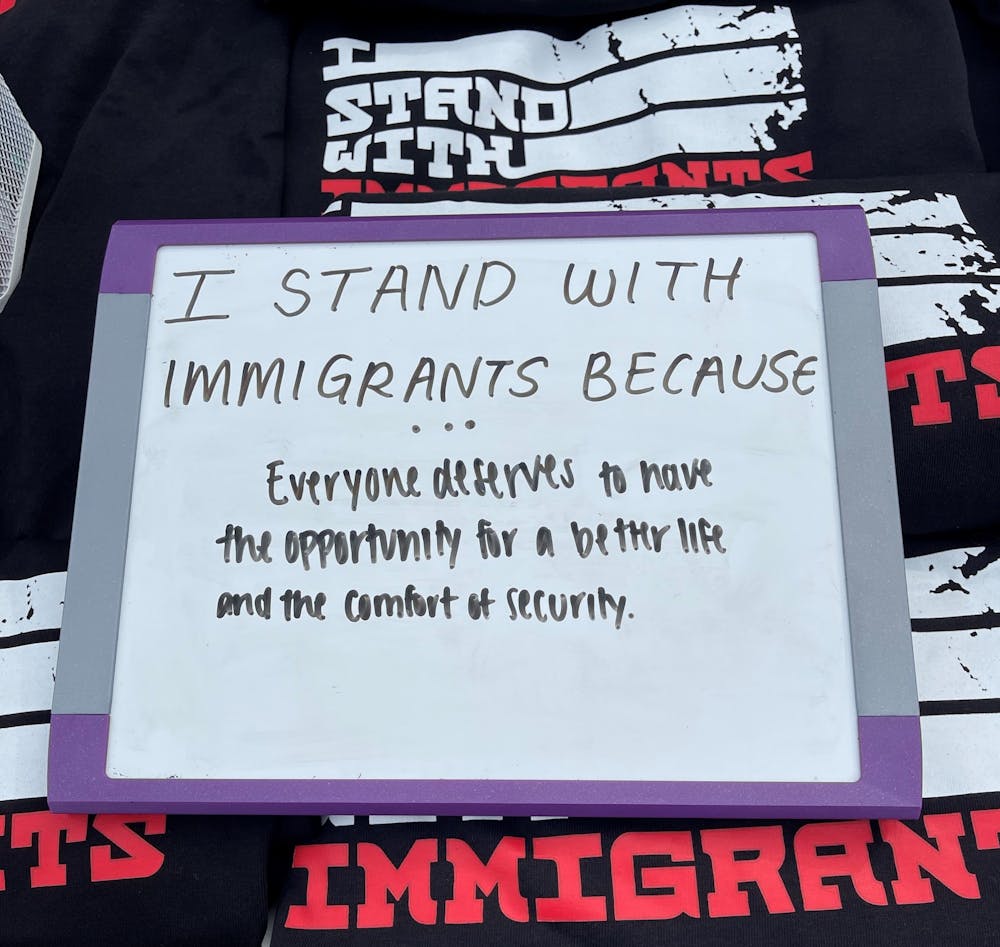Lea en español
Student-led organization undocUVA hosted an event in observance of the sixth annual “I Stand With Immigrants Day” on Thursday from 11 a.m. to 4 p.m. outside of Newcomb Hall. Student leaders invited students to learn more about undocUVA and its advocacy efforts as well as share why they stand with immigrants.
UndocUVA was founded as Dreamers on Grounds in 2015 with a focus on supporting students at the University who are eligible for the Deferred Action for Childhood Arrivals immigration policy, which protects undocumented immigrants who arrived in the country as children from deportation. Since then, the organization has expanded its campaign efforts to advocate for systematic changes to University policies and barriers facing undocumented students, in particular policies that affect matriculation and financial aid availability.
I Stand With Immigrants Day is a nation-wide initiative that invites immigrants and allies to share their experiences and drive actions that emphasize and demonstrate the benefits of immigration.
Caro Campos, fourth-year College student and president of undocUVA, said the event calls attention to the complex issues and experiences faced by immigrants in the U.S.
“Even though our organization is focusing on undocumented people, we are really trying to think about, what [it looks like] to have not only migrant rights, but also migrant liberation. People can have rights but are their needs really being met?” Campos said. “We are really just trying to call attention to a plethora of issues that undocumented people experience.”
The organization previously campaigned for the University to permit all students to matriculate regardless of immigration status, a policy which the University officially approved in June 2020. Prior to this, the University had extended access to institutional aid for DACA and undocumented students in 2019.
The tabling event included a “I Stand With Immigrants” t-shirt raffle and offered students the chance to consider their personal reasons for supporting the initiative. With student permission, the organization shared some of these statements on social media — students explained that they stand with immigrants because “humanity has no borders,” “no human is illegal” and “I come from a family of immigrants.”
“I think I have a very emotional connection just because my parents were immigrants,” said Gabby Paz, a second year College student and member of undocUVA. “I [am] grateful that my parents have documentation, but it angers me that people have to go through so many barriers in order to have an opportunity here.”
Paz also noted her frustration with the extensive barriers facing immigrants in the U.S. and the moral implications of describing immigration and humans as “legal” or “illegal.” Pathways to achieving legal status in the U.S. are highly regulated and largely restricted to employment, family reunification or humanitarian protection, regardless of time spent in the country or payment of taxes. Wait times for green cards — which permit immigrants to hold permanent legal residence in the U.S. — have also increased significantly in the past three decades and average upwards of five years.
“I think [...] most Americans feel comfortable with the idea of immigration, but only if it's legal,” Paz said. “But I don’t think they understand or they know all [of] the barriers and just how impossible it is to come into the United States legally.”
Currently, undocUVA is focusing on eliminating the remaining barriers undocumented students face, such as access to financial assistance, informational and academic barriers and cultural barriers. The organization’s campaign efforts include pushing for the University to commit to providing financial assistance for all undocumented students and a mutual aid campaign that has raised over $8,500 to support undocumented students so far.
According to Campos, demands include expanding financial aid access and private funding resources for all undocumented students and hiring a full-time undocumented student coordinator as well as more professors who specialize in immigration.
The organization also demands that undocuALLY trainings are mandated for faculty. Open to the public, these are informational trainings and discussions on policies and barriers regarding immigration as well as undocUVA’s organizing efforts.
“Our demands really remain building infrastructures of support that go beyond just emergency grants or crisis response needs,” Campos said.
For Campos, who emigrated to the U.S. when she was 10 months old, the tabling event for I Stand With Immigrants Day was an opportunity to have a conversation about the privilege and marginalization surrounding citizenship in the U.S.
“Having citizenship is such an incredible privilege, and it’s something that often kind of goes under the radar in our conversations on identity, on lived material experience, on oppression and marginalization,” Campos said. “We’re really calling on the University to really acknowledge and really reckon with [these conversations] and deal with [them] in material ways.”







